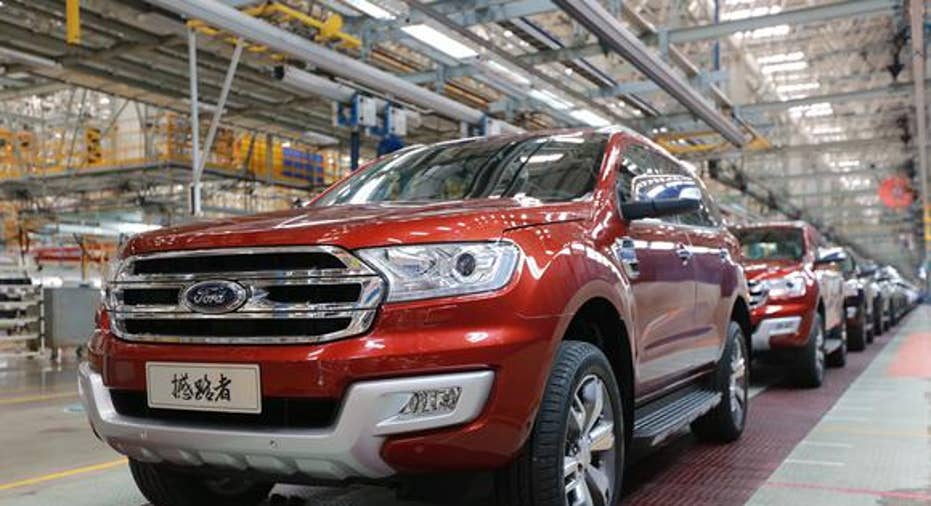Ford's SUVs Help Drive Growth as China's Economy Slows

Ford's Chinese joint-venture company Jiangling Motors began building the truck-based Ford Everest SUV last year.The Everest is a midsize SUV that is well regarded for itsoff-road abilities. SUV sales have helped drive Ford's growth in China this year. Image source: Ford Motor Company.
Ford Motor Company said that its sales in China rose 5% in March, giving the Blue Oval a 14% first-quarter gain in the world's largest new-vehicle market.
What Ford said: Ford has two joint ventures in China. The first, Changan Ford Automobile (CAF), builds and sells passenger cars and SUVs, most of them familiar products from Ford's global portfolio. It's doing well: CAF's sales were up 12% in March, and rose 23% in the first quarter versus the year-ago period, to 244,411 vehicles sold.
Ford said in a statement that its SUVs "continue to be in high demand with Chinese customers." Combined sales of Ford's SUV portfolio, which in China includes the Ecosport, Kuga (twin to the Escape), Edge, Explorer, and Everest, were up 38% in the first quarter versus a year ago, to 79,964 vehicles.
Performance cars are also doing well for Ford in China. Sales of the Mustang jumped 75% in the first quarter, while sales of the popular imported-from-America Focus ST rose 23% over the same period.
Ford's other Chinese joint venture, Jiangling Motors Corporation (JMC), builds and sells trucks and commercial vehicles, including some of Ford's Transit vans, the midsize Ranger pickup, and that Ranger-based Everest SUV. It's doing less well: Like most of its rivals in China, JMC's sales are suffering as China's construction boom fades. JMC's sales were down 11% in the first quarter, to 60,306 vehicles. Sales were down 8% in March.
In addition to its joint ventures, which build Ford's vehicles locally in China, Ford also imports a number of products that it sells via its own operations. Those include the Lincoln-brand vehicles sold via a growing network of dealers in China. Lincoln's sales totals in China are still small, with just 5,484 vehicles sold in the first quarter. But growth is very good: That's a threefold increase from a year ago. Lincoln now has 37 dealers in China.
"We are pleased with the continued growth and positive customer response our products continue to receive in China," said John Lawler, chairman and CEO of Ford Motor China, in a statement released on Thursday. "We remain committed to offering a great portfolio of vehicles and providing world class service to our valued customers."
What it means for Ford and its investors: Despite concerns about the slowing Chinese economy, Ford managed to find good growth in China during the first quarter. That bodes well for first-quarter profits from the joint ventures, which Ford records as equity income.
SUVs appear to have had a lot to do with that sales gain: Like their counterparts in the U.S. and Europe, Chinese car shoppers are increasingly choosing car-based "crossover" SUVs over traditional sedans. That favors Ford, with its deep portfolio of well-regarded crossovers.
Ford's sales in China are still well behind those of old Detroit rival General Motors , which had already built a big Chinese operation by the time Ford began its aggressive China expansion in 2012. Ford put nearly $5 billion into that effort, and it's now paying off: Ford now has a large, profitable, and growing business in China, and its balanced and up-to-date product portfolio should continue to deliver gains as the year goes on.
The article Ford's SUVs Help Drive Growth as China's Economy Slows originally appeared on Fool.com.
John Rosevear owns shares of Ford and General Motors. The Motley Fool owns shares of and recommends Ford. The Motley Fool recommends General Motors. Try any of our Foolish newsletter services free for 30 days. We Fools may not all hold the same opinions, but we all believe that considering a diverse range of insights makes us better investors. The Motley Fool has a disclosure policy.
Copyright 1995 - 2016 The Motley Fool, LLC. All rights reserved. The Motley Fool has a disclosure policy.



















